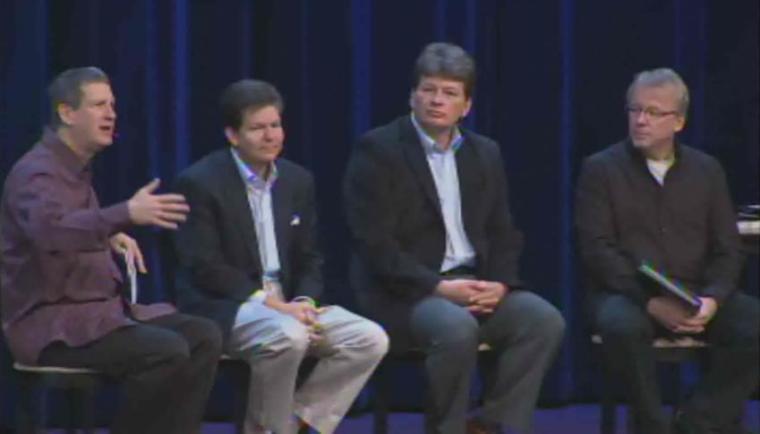
Strobel spoke about the results of that survey at an apologetics conference Saturday from Cherry Hills Community Church in Highlands Ranch, Colo., and simulcast to more than 75 churches throughout the U.S., Canada, and Australia. He was one of four speakers at the event called, "The Questions Christians Hope No One Will Ask."
"By far, the number one question that people wanted to ask God is 'Why He allows pain and suffering in this world?' In the survey that Mark [Mittelberg] did more recently where he asked Christians 'What are you afraid of being asked?' this was one of the top questions as well," Strobel said during the conference.
He tackled the tough question of pain and suffering during one of several sessions that featured Mttelberg, who is his co-founder along with Strobel of The Institute at Cherry Hills, an apologetics and evangelism ministry, and scholars Craig Hazen and Douglas Groothuis.
Strobel said the question is raised by two different types of people. The first kind of person is one that is presently going through pain and suffering.
Order Online: The Case for Faith
"When someone is raising this issue with me and I know they are coming from that perspective I know that they really don't want the long, intellectual answer about why God allows pain and suffering," he said. "When you are in the midst of suffering you are looking for someone to be Jesus to you. You are looking for someone to love you and help take care of you, and reach out to you.
"It's important for us to understand that when people raise this issue it's not always because of an intellectual curiosity," Strobel explained. "It's about their own hurts and we need to be sensitive to that."
There are other people that bring up the question because it is a legitimate intellectual question to ask, he said.
"We don't have a complete answer. 1 Corinthians 13:12 says on this side of heaven we sort of see things dimly (paraphrase). We don't understand everything. We are not God," Strobel continued. "But, I believe that God has revealed enough to us that we do have enough of a satisfactory answer to minister to our hearts and souls to this particular question."
Jesus was honest about this issue, he said.
"There are Eastern religions that deny the reality of pain and suffering. They just try to wipe it away by saying it's all an illusion. Well, Jesus didn't call it an illusion. In John 16:33 Jesus said, 'In the world you are going to have tribulation.' You are going to have trouble. You are going to have pain. You are going to have suffering," Strobel insisted. "Why? Because we live in a sin scarred cosmos."
Even though the issue of pain and suffering is a legitimate topic it does not negate all of the positive, affirmative evidence we have for the existence of God, he said.
Strobel then asked, "So, what does God reveal about this issue to us to help us process?"
"The first thing is this. God is not the creator of evil, pain, and suffering. This answers the question, 'Why didn't God create a world where people don't suffer?'
"The answer is He did. Genesis 1:31 says God saw all that He had made and it was very good," he continued. "But if God is not the author of pain and suffering where did it come from? God has existed from eternity past as the Father, Son, and Holy Spirit in perfect harmony in relationship, the relationship of love that has gone on for eternity.
"When God reached a decision He wanted to create humankind He wanted humankind to experience this greatest value in the universe, which is the value of love. Well, the only way we can experience and express love is if we have the free will to love or not to love," he said.
Love always involves a choice, Strobel explained. "We human beings have abused our free will by rejecting God and by walking away from Him." The result has been evil entering the world and bringing pain and suffering by the wrong moral choices people make. The other type of evil is natural evil such as disasters, he said.
"This is a sin-corrupted world, not as God created it," he said.
Another point made by Strobel on the topic is that although suffering is not good, "God can use it to accomplish good."
Other questions discussed at the conference included:
• "What makes you think God exists at all?"
• "Why trust the Bible; isn't it full of mistakes?"
• "Jesus was a good man – but the Son of God?"
• "Why choose Christianity over all the other religions?"
• "Is hell real – and does God really send people there?"
Mittelberg told The Christian Post before the conference that he and the other speakers wanted to instill in Christians the confidence that not only is the Christian faith true, but it is also defensible.
"To know that we really do have, by God's grace, truth that stands up to scrutiny," Mittelberg said. "More than that, we hope this will encourage believers to move from just putting up a good defense (1 Peter 3:15) to actively getting on the offense (2 Corinthians 10:5) – initiating conversations and lovingly showing their friends the evidence and logic that backs up our faith, and ultimately encouraging those friends to put their trust in Christ."
Strobel and Mittelberg plan to lead another conference called "Unpacking Atheism" in October that will also be available to churches interested in hosting a simulcast.